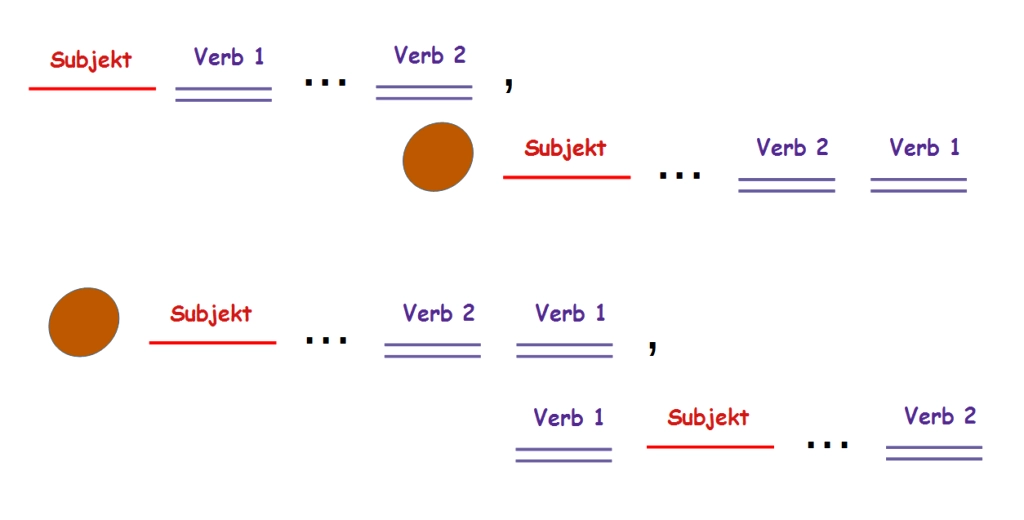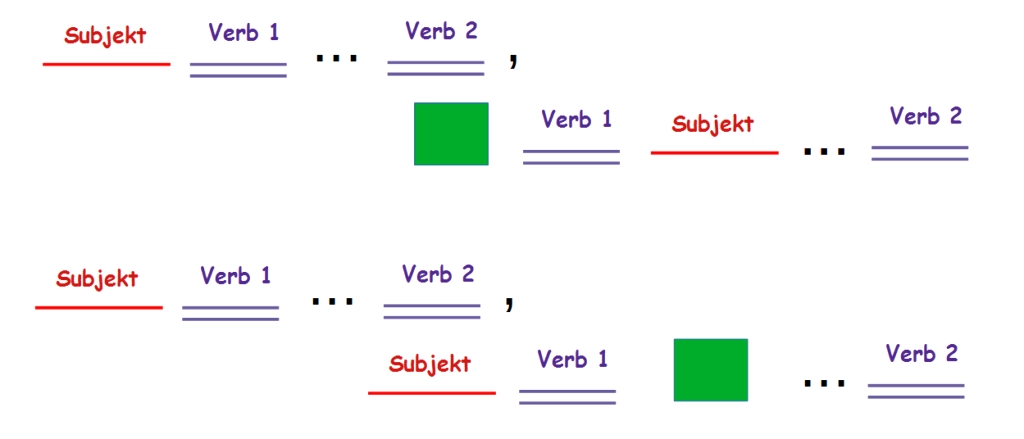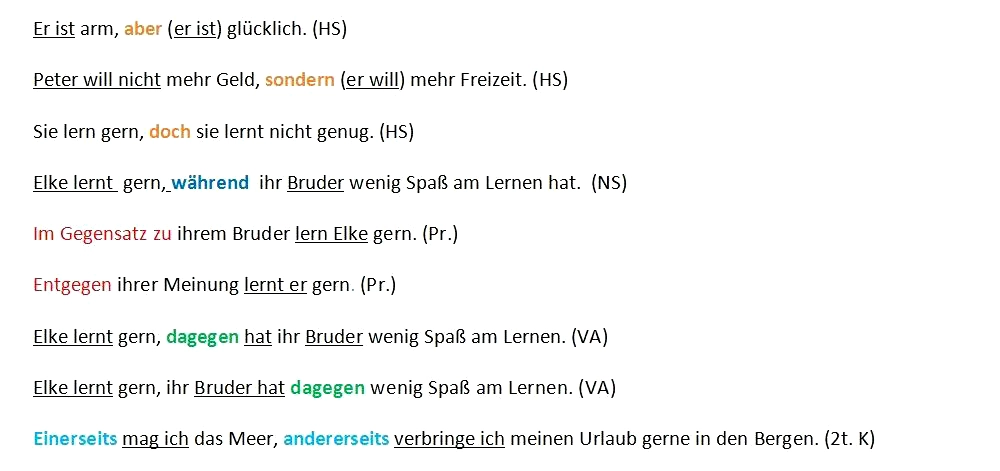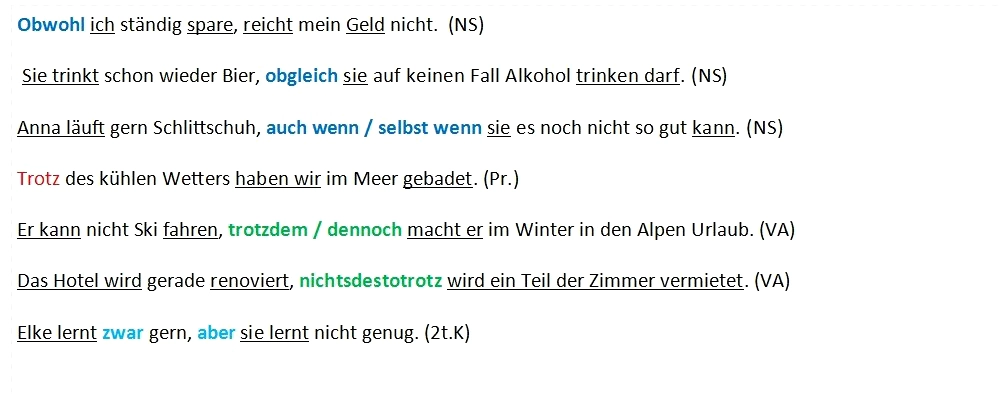Last Updated on October 10, 2023
For me, when I was at the A2 level, it was a big mystery why, when we join the second parts of sentences with the same explanatory meaning, but different conjunctions (denn, weil, deshalb), the word order changes all the time. On the courses the teachers could not clearly explain this to me – you just have to remember. And I hate “just remember”, I prefer to understand. Therefore, we are looking for the answer ourselves.
It will be about conjunctions and connector adverbs, and for the sake of completeness, we will also take prepositions.
Conjunctions in sentences. Different word order. Part 2
Modal verbs in German
Past tense in German. Perfect and preterite
Separable verbs in German
Basic German with tables. 2. Noun and articles
Picture description in German B1
Essay description in German. 1. Way
Difference between verschieden, unterschiedlich, anders
What is DTZ b1 level test
Word order in German
Connector adverbs (Konnektoradverbien, or Verbindungsadverbien) differ from conjunctions (Konjunktionen) in that they are members of a sentence. And since connector adverbs are members of a sentence, they occupy a certain position in this sentence (for example, the first, and not zero, like a conjunctions), and from this follows a certain place of the verb.
How to distinguish? Connector adverbs have their own meaning and are used like ordinary words in simple sentences. Many of them can be replaced in the middle of the sentence (the order of other words will change accordingly).
Thus, a sentence with two main parts connected by a conjunction (Hauptsatz + Hauptsatz, HS + HS) will look like this:
Conjunction has Position 0,
Subject – Position 1,
Verb – Position 2.

Wir (subject, 1) gehen (verb, 2) heute spazieren (second part of the verb), und (conjunction, 0) wir (subject, 1) möchten (verb, 2) auch unsere Freunde besuchen (second part of the verb).
A sentence with a main and a subordinate clause connected by a conjunction (Hauptsatz + Nebensatz, HS + NS) will look like this.
In the first sentence a conjunction takes Pos. 0.
Wir (subject, 1) gehen (verb, 2) morgen spazieren (second part of the verb), weil (conjunction, 0) wir (subject, 1) heute unsere Freunde besuchen (second part of the verb) möchten (verb).

In the second sentence entire subordinate clause (Nebensatz) takes Pos. 1 and conjunction stands on the Pos. 0.
Da (conjunction, 0) wir heute unsere Freunde besuchen (second part of the verb) möchten (verb) (whole part is on the position 1 for next part), gehen (verb, on the position 2 after part 1) wir (subject) morgen spazieren (second part of the verb),
A sentence with two parts connected by a connector adverb will look like this (two variants).
First sentence:
connector adverb has Pos. 1,
Verb – Pos. 2.
Wir (subject, 1) möchten (verb, 2) heute unsere Freunde besuchen (second part of the verb), deshalb (connector adverb, 1) gehen (verb, 2) wir morgen spazieren (second part of the verb).

Second sentence:
subject has Pos. 1,
Verb – Pos. 2,
connector adverb somewhere further.
Wir (subject, 1) möchten (verb, 2) heute unsere Freunde besuchen (second part of the verb), wir (subject, 1) gehen (verb, 2) deshalb morgen spazieren (second part of the verb).
Now let’s try to present the complete list in the tables. Subject and predicate are underlined.
Connecting meaning “and”
But first, briefly about how to express the meaning of “and“.
– conjunction und
Sie lernt Deutsch und (sie lernt) Englisch.
– sowohl… als auch (“both”, only used inside one Hauptsatz)
Sie lernt sowohl Deutsch, als auch Englisch.
– nicht nur… sondern auch (not only but)
Sie lernt nicht nur Englisch, sondern (sie lernt) auch Deutsch.
– weder… noch (take Position 1!). “And” in negation: no to one and no to the other
Sie lernt weder Englisch, noch (lernt sie) Deutsch.
Weder will ich schlafen, noch bin ich müde.
Follow me
Adversary meaning
Now adversary sentences (contrast, opposition: but, however, but, but …) – in German they are called Adversativsatz.
Here we already have a full range of options. How to distinguish a conjunction (first column) from an adverb (fourth column)? The adverb can be replaced.
All tables can be enlarge (Picture open).


Concessive meaning
Concessive sentence (limitation: although, despite the fact that)
Konzessivsatz


Next – part 2
Do you enjoy the site without cookies and maybe without ads? This means that I work for you at my own expense.
Perhaps you would like to support my work here.
Or Cookie settings change: round sign bottom left
